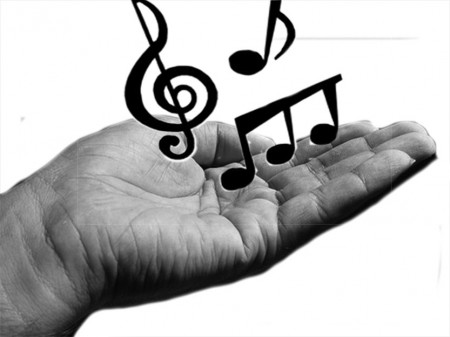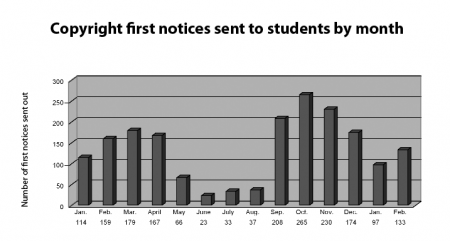
Simultaneously upholding Mason’s honor code and creating Hollywood’s next big venture, George Mason University’s Copyright Resources Office is fighting an ongoing war — robots vs. pirates.
According to the Copyright Office’s website, “The music industry association has commissioned the building of ‘locator bots,’” to catch the piracy of copyrighted content. So it begins.
Claudia Holland, head of the Copyright Office since 2006, handles all copyright issues at Mason. Her assistant, Jacquelyn Rioux, handles copyright infringements.
Illegal downloading has become a popular alternative to buying copyrighted content. According to Holland, most downloaded content on campus is music, followed by movies and television shows.
“This is not only a violation of federal law, which people tend to forget,” said Holland. “It’s also an honor code violation at this university and it’s a violation of the responsible use of computing policy, which is what we have in place to protect our university network.”
According to the Copyright Office’s website, “The University Responsible Use of Computing policy forbids users from using Mason computing resources and networks for copyright violations.”
Although the Copyright Office sends out the notices to Mason students for copyright infringement, the content owners are the ones who are catching perpetrators by using locator bots.
Individual companies, like Warner Bros., HBO or Columbia Records, may look for content under their label. However, associations like the Recording Industry Association of America or the Motion Picture Association of America are more virulent as a collective.
According to the Copyright Office’s website, the locator bots “systematically scan IP addresses looking to see if any of the common music sharing programs is active on a port (e.g., LimeWire, eDonkey, KaZaA). The bot asks the music program whether it has music and movie titles by particular artists. If the program answers positively, the bot reports the IP address and title to an authority, who then sends out violation notices.”
Through computer logs, computer lab managers can track the perpetrator by seeing who was logged onto the Mason network and using the information provided.
“We get a notice that has a timestamp on it, the name of the song, an IP address, a port number and what program they’re using,” Holland said. “So the information the RIAA sends us, we send to network operations. They identify who was logged on at that time, on that port, on that IP address.”
In addition, they work with internet providers to receive important information.
“The content industry is getting much more savvy and pressuring commercial providers like Cox and Verizon to shut down people who are downloading,” Holland said.
Rather than punish students after their first infringement, the Copyright Office offers a lenient three-step notification process.
The first “stop-it” notice gives students the benefit of the doubt. The notice reads, “Someone using a login registered to you is apparently sharing downloaded copyrighted music files, whose copyright owners have objected. … This notice specifies an IP address and time corresponding to a login registered to you … I have been requested to ask you to remove the material immediately.”
Although it may seem like a foolproof way to catch thieves, Holland said the information is not enough to prove someone’s guilt.
“They may have left their computer unattended,” Holland said. “They may have logged on to a friend’s or to a public computer and may not have logged off all the way.”
The second notice requires the perpetrator to make an appointment with Holland within a week of the notification. If they ignore the second notice, their access to the Mason network will be revoked, but they will still have access to their e-mail.
“This takes a lot of students by surprise,” Holland said.
On the third notice, the case is turned over to the Office of Judicial Affairs. According to Holland, this rarely happens.
“At some universities, students are cut off from the network on the first notice,” Holland said. “They have to pay a fee to be reinstated. This gets expensive for a college student. We don’t want to go that route right now.”
In 2008, junior Bobby Edmonds received a notice for illegally downloading three seasons of the HBO show “Entourage.” He said they knew his IP address and exactly where he downloaded the files. Although he got caught once during his freshman year, he has not gotten any more notices.
“I still download stuff through Mason because they have really fast internet,” Edmonds said. “I have probably 500 movies on my computer and 100 gigs of music.”
In addition, he discussed his methods of downloading.
“A lot of people don’t use torrents anymore,” Edmonds said. “They’re starting to use direct downloads.”
Holland’s focus is on educating students about copyright laws. She works with University 100 classes and resident advisors to educate students on illegal downloading and internet safety.
“A student is a creator because they are creating content for their classes,” Holland said. “So they’re writing papers, they’re creating media projects, they’re doing art — they’re doing all kinds of things. Those are their creations so they get a protection from the law as well.”
Holland’s final words of advice: “Be savvy.”







Comments